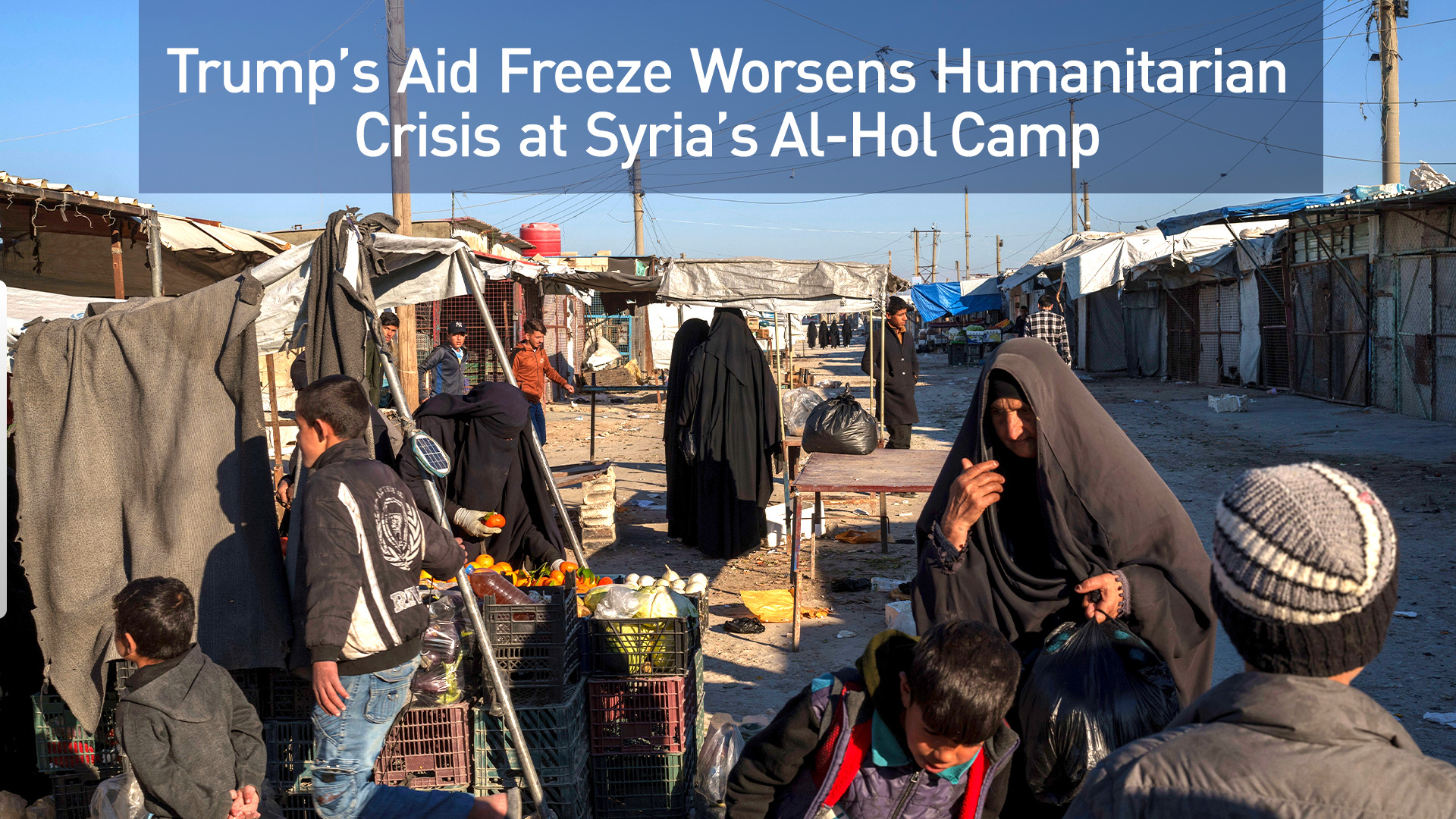Trump’s Aid Freeze Worsens Humanitarian Crisis at Syria’s Al-Hol Camp
ISIS Sleeper Cells Pose Rising Threat as Aid Suspension Sparks Unrest in Al-Hol Camp

Feb. 3, 2025
AL-HOL, Syria (AP) — Thousands of women and children with alleged ties to the Islamic State (ISIS) are facing worsening humanitarian conditions in Syria’s al-Hol camp after the Trump administration froze U.S. foreign aid, triggering the suspension of critical relief services.
The aid halt, part of a broader freeze on U.S.-funded humanitarian programs worldwide, has left residents scrambling for food and essential supplies.
The U.S.-based organization Blumont, which manages many operations in the camp under the supervision of the U.S.-led coalition, briefly suspended its services following the freeze. Blumont had been distributing bread, water, kerosene, and cooking gas—lifelines for the camp’s 37,000 inhabitants.
“We were troubled when Blumont suspended its activities,” camp resident Ahmad Abdullah Hammoud, who denies links to ISIS told AP. “Believe me, we did not find food. Even bread only came at 2 p.m.” Another resident, Dirar al-Ali, described the situation as dire.
Uncertain Future Amid Security Risks
Camp director Jihan Hanan condemned the aid freeze, calling it a “disgraceful decision.” She warned that if basic needs cannot be met, residents will demand to leave. “Blumont distributes 5,000 bags of bread daily at a cost of about $4,000, something local authorities in the Kurdish-run enclave cannot afford,” she told AP.
Blumont has since received a temporary two-week waiver from the Trump administration, allowing it to resume operations as of January 28. However, the long-term future remains uncertain. Syrian Democratic Forces (SDF) commander Mazloum Abdi confirmed he has raised the issue with U.S.-led coalition officials, hinting that an exemption might be granted for northeastern Syria.
The crisis comes at a time of heightened security concerns. Following the fall of Bashar al-Assad’s government in early December, ISIS is reportedly attempting to exploit the power vacuum. Intelligence from the U.S.-led coalition, the Iraqi government, and the SDF suggests ISIS sleeper cells are planning attacks on the camp, prompting an increase in security.
Al-Hol: A Breeding Ground for Extremism?
The sprawling al-Hol camp, infamous for its dire conditions and radicalized residents, remains a security challenge. Among its 37,000 occupants, approximately 16,000 are Iraqis and 15,000 are Syrians. Another 6,300 people, mostly wives, widows, and children of ISIS fighters from 42 different countries, live in a heavily guarded section known as the Annex.
The camp lacks paved roads and is strewn with trash. Many children and teenagers, with little to occupy their time, are exposed to extremist ideology. When AP journalists visited, children in the Annex threw stones at them and shouted, “You are a Satan” and “The Islamic State is lasting.”
A Chinese woman in the Annex, who identified herself as Asmaa Ahmad, said she fears returning to China and insists her “sustenance is from God.” She added that she is waiting for ISIS members to rescue her family.
Hanan warned that al-Hol is "the most dangerous place in the world" and urged countries to repatriate their citizens to prevent children from growing up under extremist influence. “This place is not suitable for children,” she stressed.
The U.S. military has repeatedly called for international repatriation efforts. “Without international repatriation, rehabilitation, and reintegration efforts, these camps risk creating the next generation of ISIS,” Gen. Michael Erik Kurilla, head of U.S. Central Command, said during a recent visit to al-Hol.
A Growing Humanitarian Disaster
As Syria undergoes rapid political changes, many Syrian camp residents have expressed a desire to return home. Hanan confirmed that local authorities have agreed to allow any Syrian who wishes to leave to do so. However, she warned that if U.S. aid is permanently suspended, the situation could quickly spiral out of control.
“Even if the camp population drops, there will be a disaster if U.S. aid is suspended again,” she said.
For now, residents of al-Hol remain trapped in uncertainty, their fate dependent on shifting U.S. policy and the fragile security situation in post-Assad Syria.